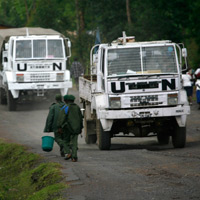

The view from the ground in South Kivu, eastern Congo, where I spent the second half of November, reveals a deeply insecure environment as a result of Kimia II, the government-led and U.N. supported military offensive against the Democratic Forces for the Liberation of Rwanda, or FDLR, rebel group. Contrary to statements by Congolese President Joseph Kabila and the conclusions from U.N. Secretary General Ban-Ki Moon’s latest report, which balance the humanitarian cost of the Kimia II against “significant military gains,” the open conflict and deteriorating humanitarian situation in South Kivu demonstrates that such conclusions are dangerously premature. The international community must accept that Kimia II has made the situation worse, not better, and adjust policy accordingly.

